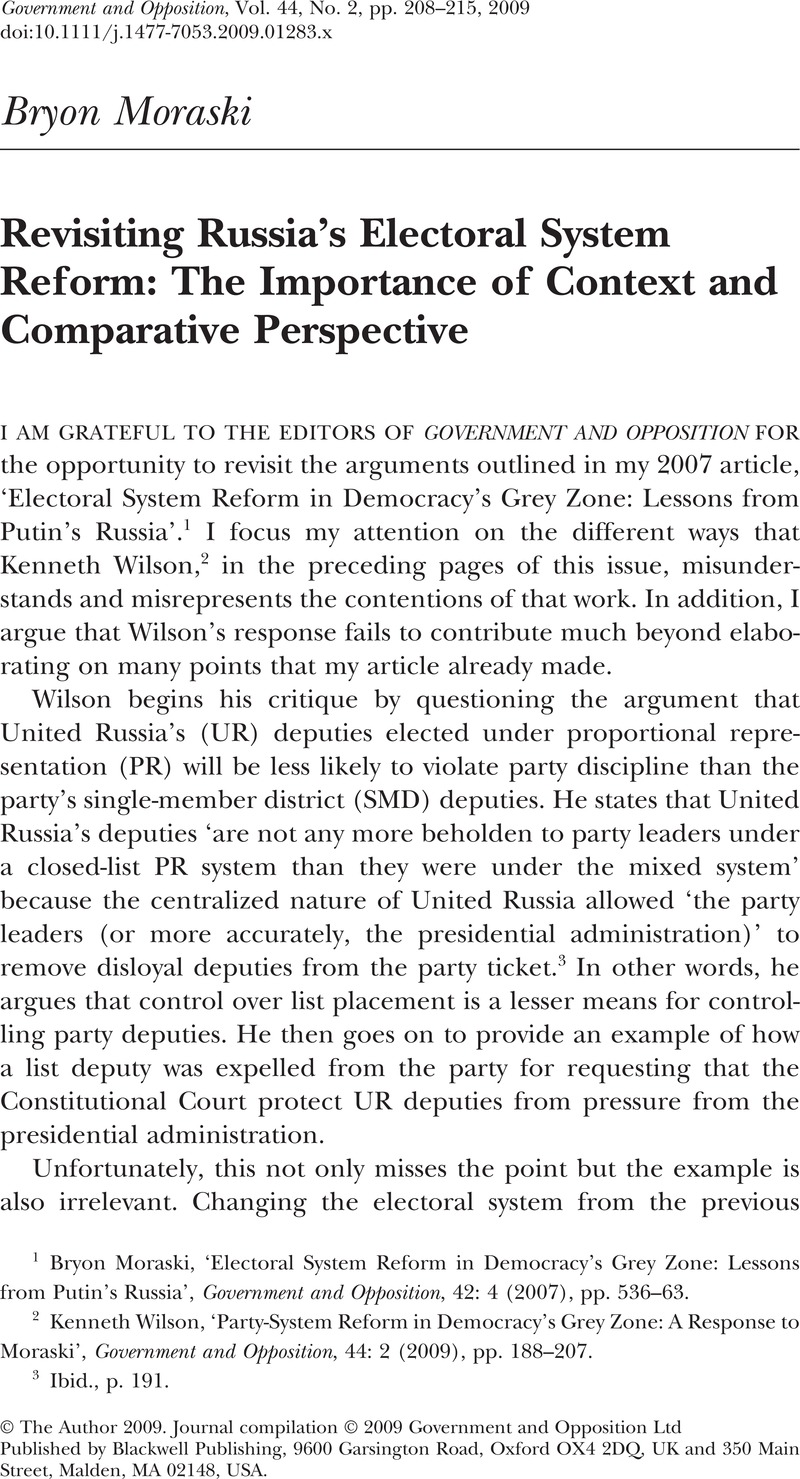Published online by Cambridge University Press: 02 January 2013

1 Moraski, Bryon, ‘Electoral System Reform in Democracy's Grey Zone: Lessons from Putin's Russia’, Government and Opposition, 42: 4 (2007), pp. 536–63.CrossRefGoogle Scholar
2 Wilson, Kenneth, ‘Party-System Reform in Democracy's Grey Zone: A Response to Moraski’, Government and Opposition, 44: 2 (2009), pp. 188–207.CrossRefGoogle Scholar
3 Ibid., p. 191.Google Scholar
4 See, for example, Eugene Ivanov, ‘United Russia: Rumors of its Death Have Been Exaggerated’, Johnson's Russia List, 5 December 2004, available at http://www.cdi.org/russia/johnson/8483-8.cfm, last accessed 12 November 2008.Google Scholar
5 Moraski, ‘Electoral System Reform in Democracy's Grey Zone: Lessons from Putin's Russia’, p. 552.Google Scholar
6 Ibid., p. 554.Google Scholar
7 Remington, Thomas F., ‘Presidential Support in the Russian State Duma’, Legislative Studies Quarterly, 31: 1 (2006), p. 25.CrossRefGoogle Scholar
8 Wilson, ‘Party-System Reform in Democracy's Grey Zone’, p. 193.Google Scholar
9 Ibid, p. 194.Google Scholar
10 Moraski, ‘Electoral System Reform in Democracy's Grey Zone: Lessons from Putin's Russia’, p. 555 (emphasis added).Google Scholar
11 Moraski, ‘Electoral System Reform in Democracy's Grey Zone: Lessons from Putin's Russia’, p. 550 (emphasis added).Google Scholar
12 Wilson, ‘Party-System Reform in Democracy's Grey Zone’, p. 198.Google Scholar
13 Moraski, ‘Electoral System Reform in Democracy's Grey Zone: Lessons from Putin's Russia’, p. 555 (emphasis added).Google Scholar
14 Ibid, p. 547.Google Scholar
15 Ibid, p. 550.Google Scholar
16 Birch, Sarah, ‘Single-Member District Electoral Systems and Democratic Transition’, Electoral Studies, 24: 2 (2005), pp. 281–301.CrossRefGoogle Scholar
17 Rose, Richard and Shin, Doh Chull, ‘Democratization Backwards: The Problem of Third-Wave Democracies’, British Journal of Political Science, 31: 2 (2001), pp. 331–54.CrossRefGoogle Scholar
18 Moraski, ‘Electoral System Reform in Democracy's Grey Zone: Lessons from Putin's Russia’, p. 542.Google Scholar
19 Ibid., p. 562.Google Scholar
20 Wilson, ‘Party-System Reform in Democracy's Grey-Zone’, p. 205.Google Scholar
21 Robert G. Moser, Unexpected Outcomes: Electoral Systems, Political Parties, and Representation in Russia, Pittsburgh, PA, University of Pittsburgh Press, 2001.Google Scholar
22 Moser, Robert G., ‘Electoral Systems and the Representation of Ethnic Minorities: Evidence from Russia’, Comparative Politics, 40: 3 (2008), pp. 273–92.CrossRefGoogle Scholar
23 Wilson, ‘Party-System Reform in Democracy's Grey-Zone’, p. 214.Google Scholar
24 Moraski, ‘Electoral System Reform in Democracy's Grey Zone: Lessons from Putin's Russia’, p. 539.Google Scholar
25 Ibid., p. 551.Google Scholar
26 Ibid. (emphasis added). See also p. 562, ‘These goals emerge as quite rational for an executive branch that has not only had difficulty establishing a lasting party of power, but that is also bracing itself for Russia's next power struggle.’ Note that at the time the original article was written, and even by the time it was accepted for publication (in autumn 2006), Putin's decision to serve as prime minister – which facilitated the surprisingly smooth transition to the Medvedev administration – was largely unanticipated. Yet, as I note in the original article, there was reason to believe that Putin would seek a third, non-continuous term (p. 550).Google Scholar
27 See Moraski, Bryon and Loewenberg, Gerhard, ‘The Effect of Legal Thresholds on the Revival of Former Communist Parties in East-Central Europe’, Journal of Politics, 61: 1 (1999), pp. 151–70.CrossRefGoogle Scholar